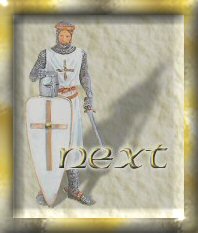|  THIRD CRUSADE MAJOR PLAYERS | Pope Gregory VIII | Issued the call for the Third Crusade in 1187 | | Saladin | Turkish general whose capture of Jerusalem & success at Hattin prompted call for a new Crusade | | Richard I, "the Lion Heart" | King of England | | Frederick I. "Barbarossa" | Holy Roman Emperor | | Isaac Angeles | Emperor of Contstantinople | | Philip Augustus | King of France | | Conrad of Montferrat | Self-proclaimed, but supported, King of Jerusalem | MAJOR BATTLES | Iconium | Captured by Frederick | | Cyprus | Captured by Richard | | Acre | After a long & mostly painless siege, the city surrendered to Richard in 1191 | | Jaffa | Crusader city captured by Saladin in 1192 | In May of 1187, the Turkish general Saladin finally proved how great his power in the East had become. The City of Jerusalem fell into the hands of his victorious army. Just a few months later Saladin soundly defeated a Byzantine army in Hattin, claiming important holy relics as part of his victory spoils. It wasn't until October of that year that the new successor to the papacy, Pope Gregory VIII, issued the papal bull for the Third Crusade. The first king to take up the cross was Frederick I of Italy. He had prior Crusading experience as a young boy during the Second Crusade, and for some odd reason was eager to set out again. Although he declared his intentions in 1188, he and his army did not set out until over a year later. Frederick commanded the largest Crusading army ever raised, several tens of thousands by closest estimates, and he did not find a warm welcome as he journeyed across the countryside. Emperor Isaac Angeles of Constantinople was the least receptive, and Frederick quickly crossed into Turkish territory in 1189. The only battle of count that Frederick engaged in was the capture of Iconium. Saladin had heard about the great size of Frederick's army and was purposefully avoiding an encounter. It was a turn in the Turks favor when Frederick accidentally drowned near Cilicia while the army was camped and resting. Without his guidance, most of Frederick's army quickly began to turn for home. Those who decided to push onwards towards Antioch suffered heavy losses.
Richard I, the Lion Hearted, was finally convinced to take up the Crusade, as well as his long time enemy Philip Augustus, King of France. The two armies met at Vezeley and split, and then remet at Sicily in 1190. Here the Crusaders had expected to find ships waiting to transport them, which were promised by the city's protector William. But William had died and a bitter feud regarding his successor had ensued. The Kings were delayed by negotiations and threats with the new protector of Sicily, Tancred of Lecce. The relationship between the two kings was further stressed when Richard announced at Sicily that he had decided against the arranged marriage between himself and Philip's sister, Alice. Richard declared that his mother had found a more suitable match. Weather further delayed their departure. When the ships were finally procured and the weather was agreeable, they left Sicily in early 1191.
Unfortunately the two kings left separately, and the island of Cyprus, and its independent ruler who had dared to deny safe dock to his mother and future wife soon distracted Richard. Richard was surprised to find unexpected help arriving in the form of Bohemond of Antioch and King Guy Geoffrey of Lusignan. They had come to seek Richard's help because King Philip had arrived in Antioch and instantly taken Conrad's position on what to do about Jerusalem. Richard quickly defeated Cyprus and claimed it for himself, before departing once again for the Crusades. His cousin Conrad of Montferrat, who had declared himself King of Jerusalem, eagerly welcomed Meanwhile King Philip. All the Crusader armies, including those of Richard, did succeed in agreeing to attack Acre, and all the troops coalesced around this city in May of 1191. Saladin and his troops still waited on the outskirts of the army, harassing the Crusaders as much as possible without provoking an open conflict. With the capture of Acre a success, Philip finally pleaded his ill health and returned to France.
Perhaps the event of this Crusade that is told with the most horror was Richard's decision to kill nearly 3,000 Muslim prisoners. He had at first negotiated with Saladin for the release of the prisoners, given a peaceful turnover of Acre, but even though Saladin kept his promises, Richard did not. He also made it a point to execute the prisoners on the summit of a hill, during a traumatic daylong execution, while Saladin's forces tried to desperately fight their way up to save them.
Richard left Acre and began the march to Jerusalem. Saladin again followed at a distance trying to pick off sections of the army rather than risk a full engagement. Saladin's one attempt to initiate a full battle during this march resulted in the near defeat of his army. In early 1192 Richard was almost on the front doorstep of Jerusalem when political problems caught up with him. The various kings and nobility of the Crusade resented Richard's usurpation of leadership of the Crusades. Philip had returned home and Richard feared that he would make an attempt to take England while he was away. Richard retreated once more to Acre in the hopes that he could make peace with Conrad, and try again. But of course, the Crusades being full of drama, as soon as Richard sent word of his support of Conrad as King of Jerusalem, Conrad was murdered. Henry of Champagne was quickly named King in Conrad's place.
With things seeming a little more stable in the East, Richard decided to make another attempt on Jerusalem in mid 1192. Again Saladin picked at his armies but did not force a full battle. This time however, Saladin's tactics were finally wearing on the Crusaders. They got within sight of the walls a second time only to retreat to Acre once again. Richard began negotiations with Saladin. Saladin's response was to attack and capture the Crusader city of Jaffa. Richard quickly ran to the rescue and chased Saladin's troops from the city. The two armies continued to skirmish just outside the city both in fighting and attempts to negotiate peace. Both Richard and Saladin seemed to respect each other, with Saladin even sending Richard horses when he had learned that his had been killed, as well as other gifts of friendship. Eventually Saladin retreated to Jerusalem but Richard's troops were no longer equipped to follow. A treaty was finally signed On September 2, 1192. Jerusalem would remain in Turkish hands but Christian pilgrims would be allowed to visit the city unthreatened. Richard returned to England the following month. His disappointment during the Crusades was further increased when he was taken prisoner by the King of Austria when traveling through his lands. When he was finally released in 1194, he returned to England and had to settle a local attempt to usurp his throne. This final battle, fought by Richard on his own soil, was popularized in the Robin Hood stories. 
|
 Free Forum Hosting
Free Forum Hosting